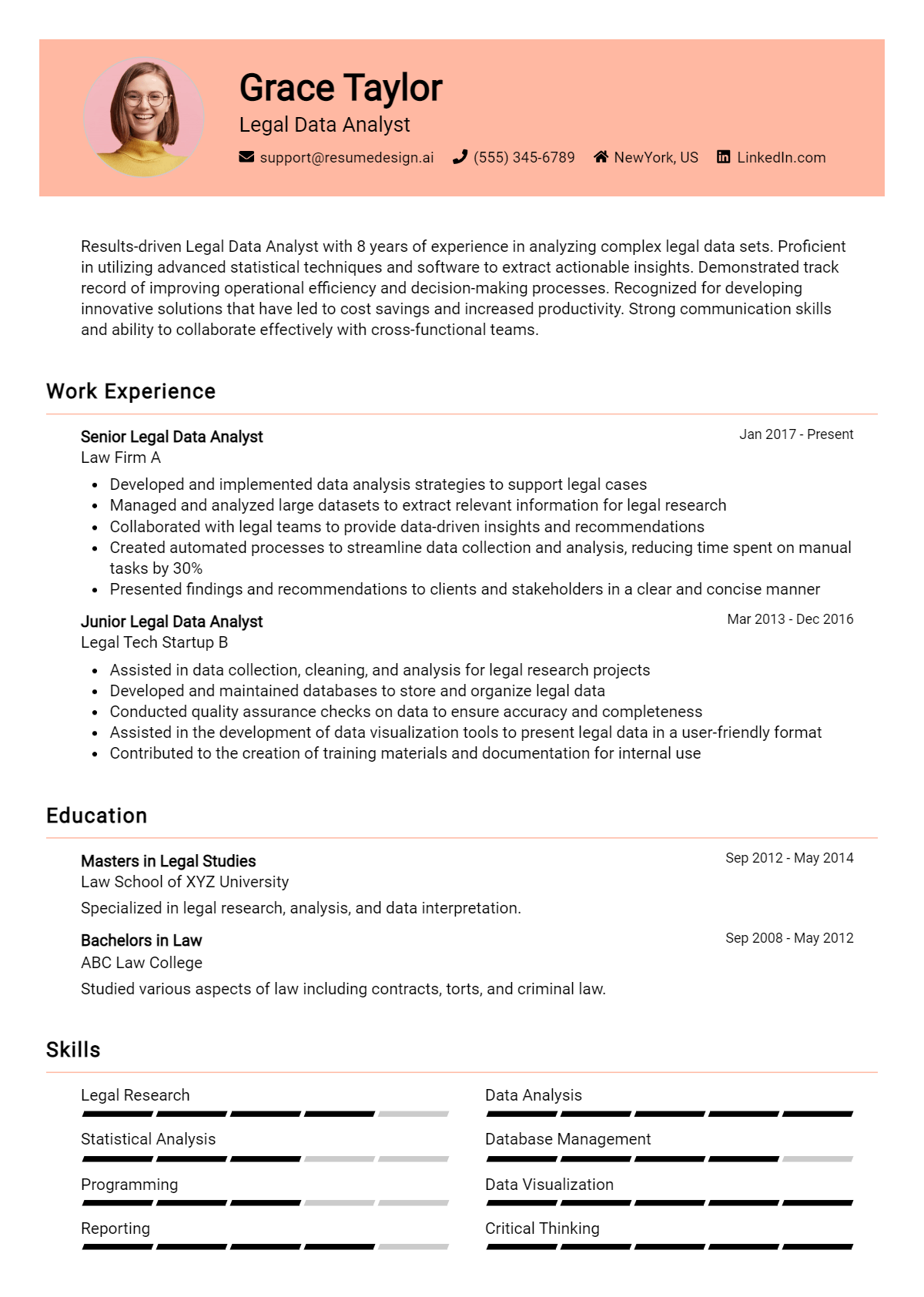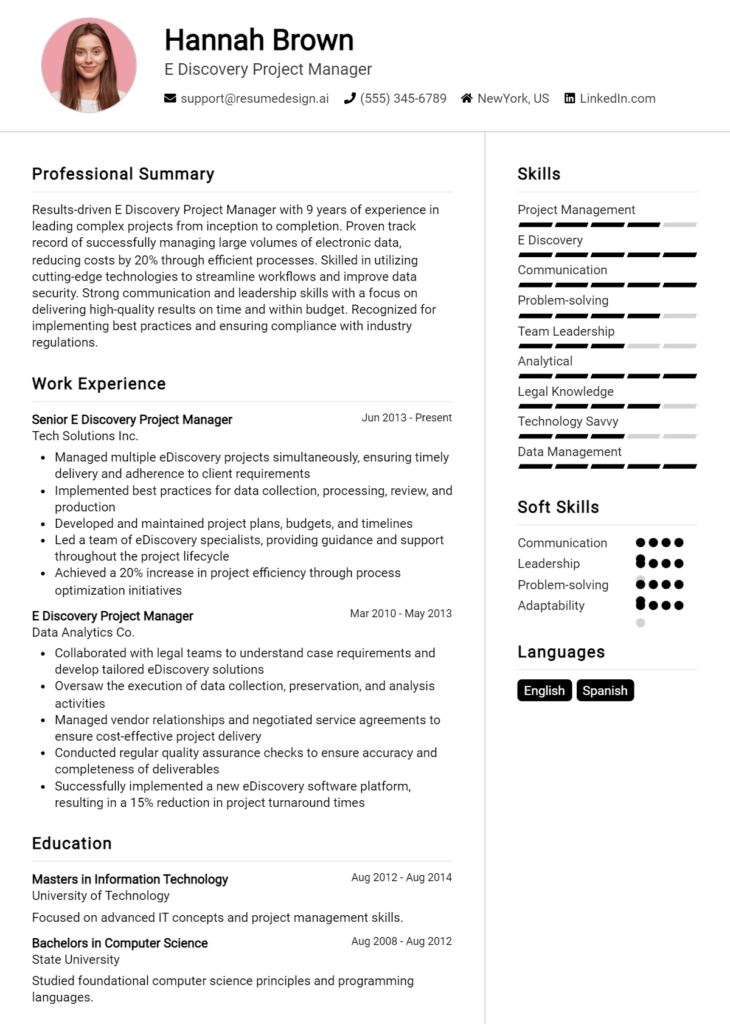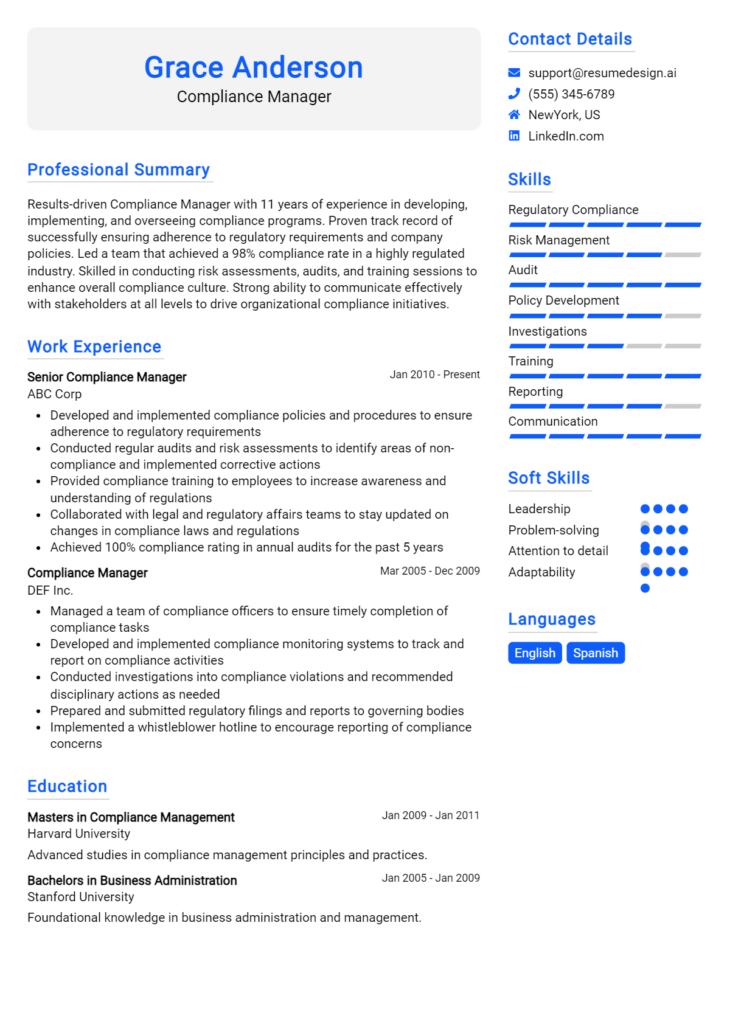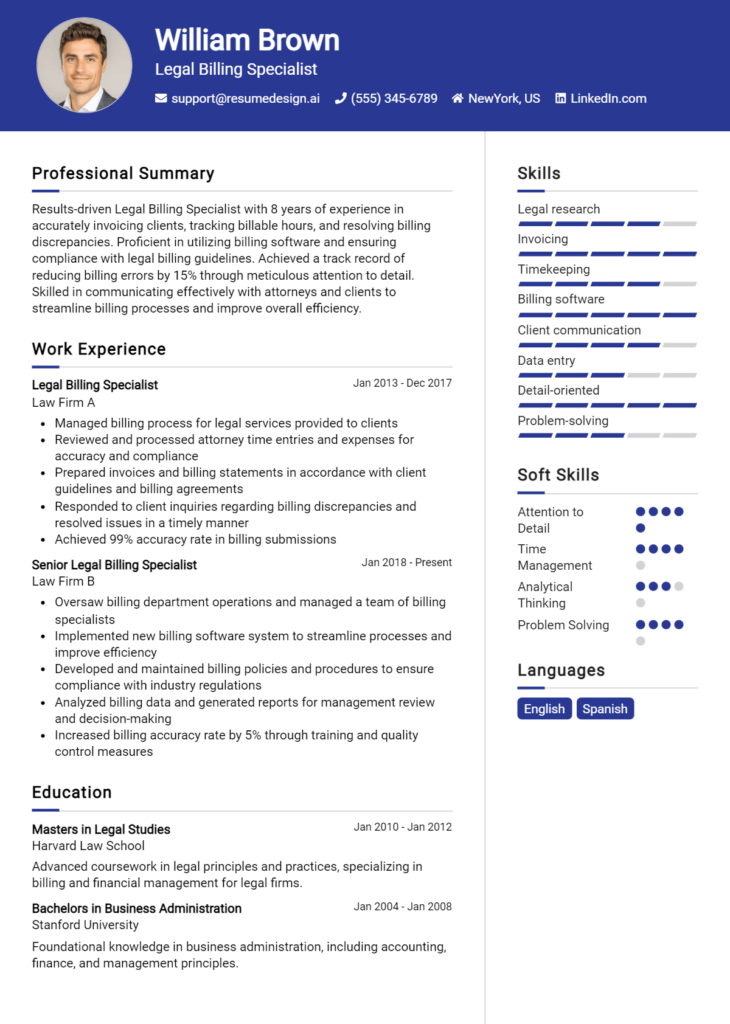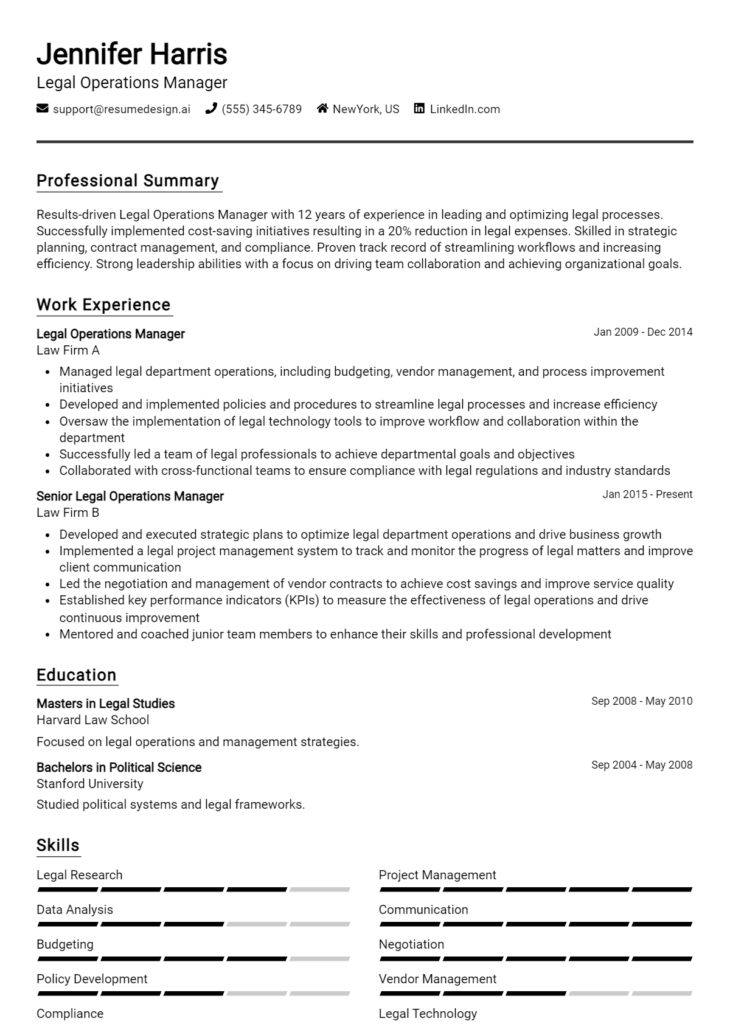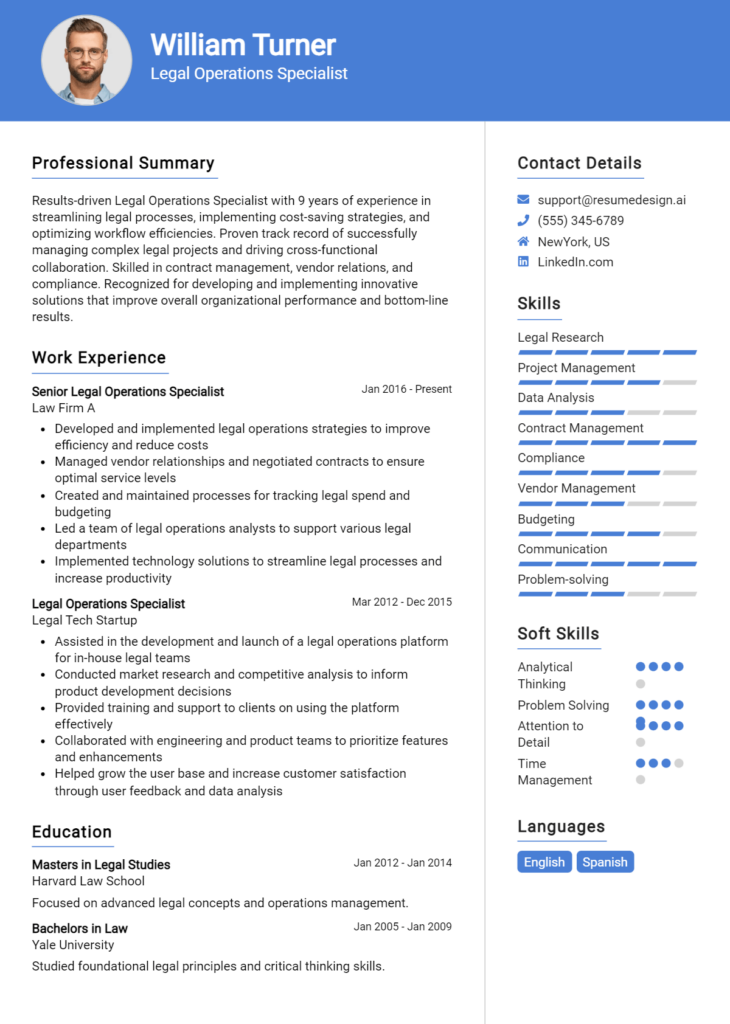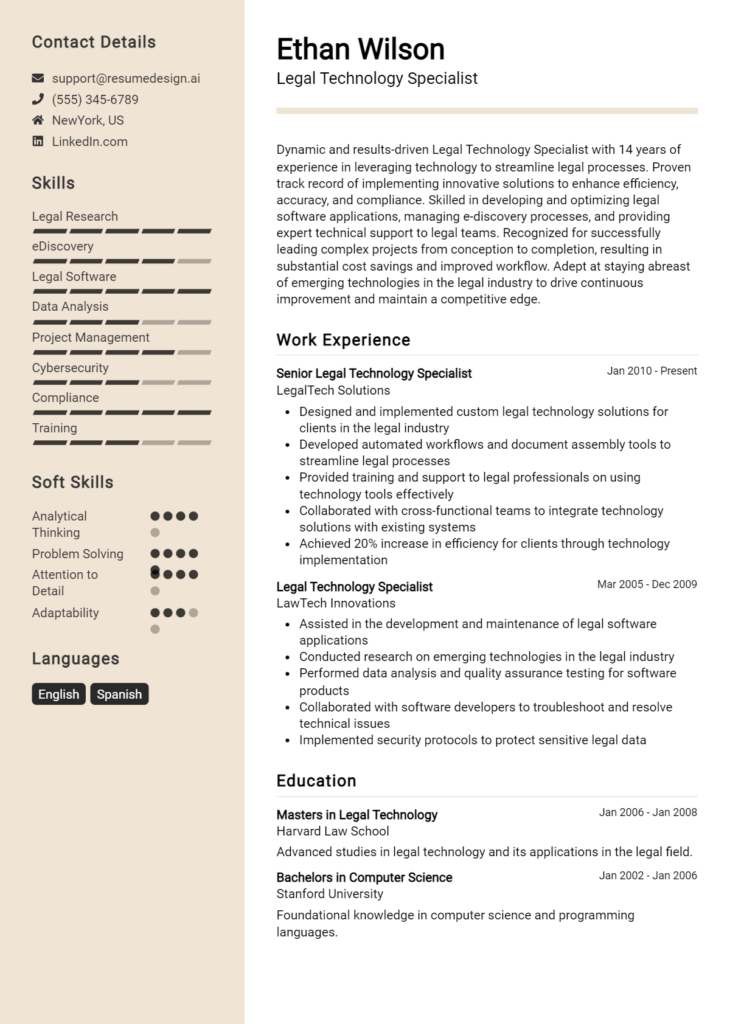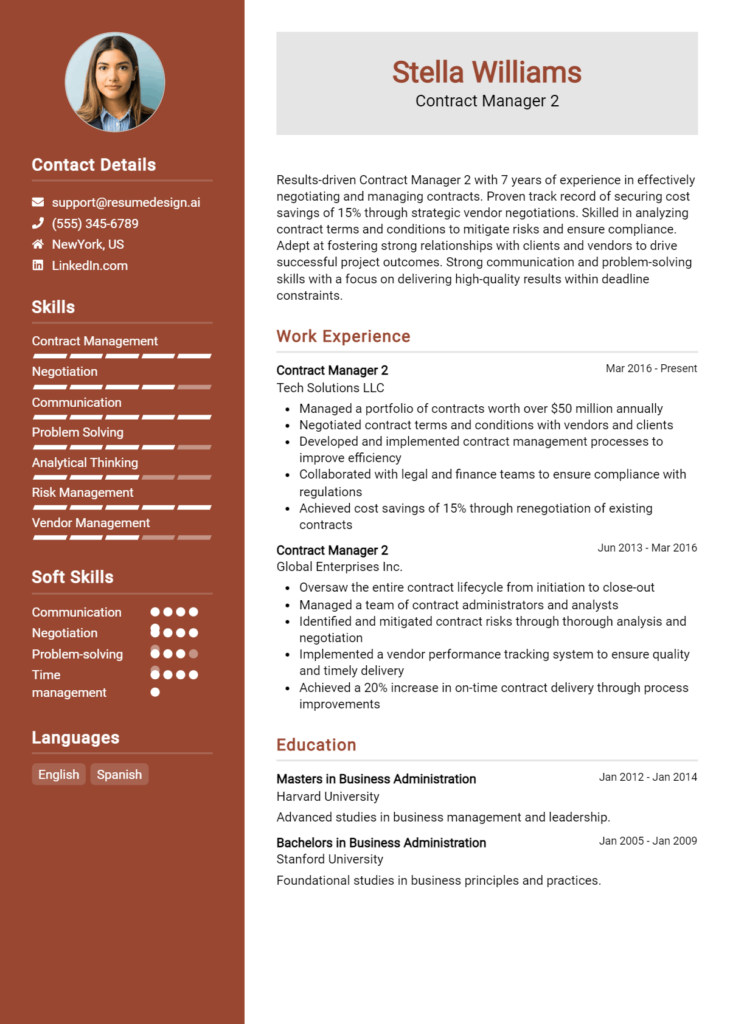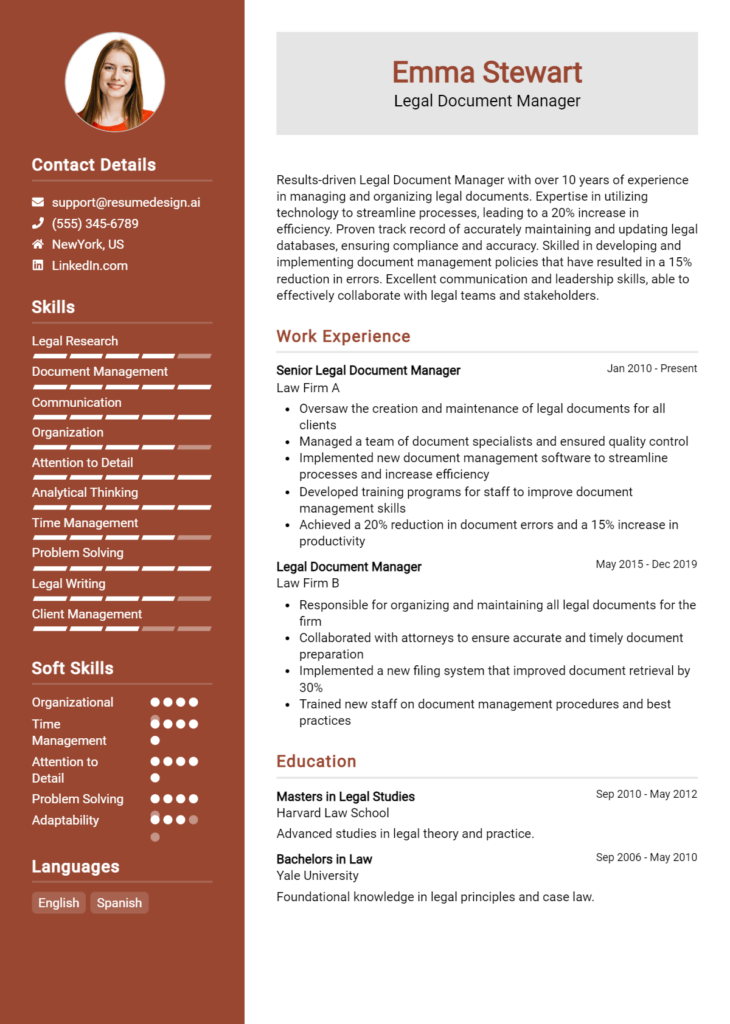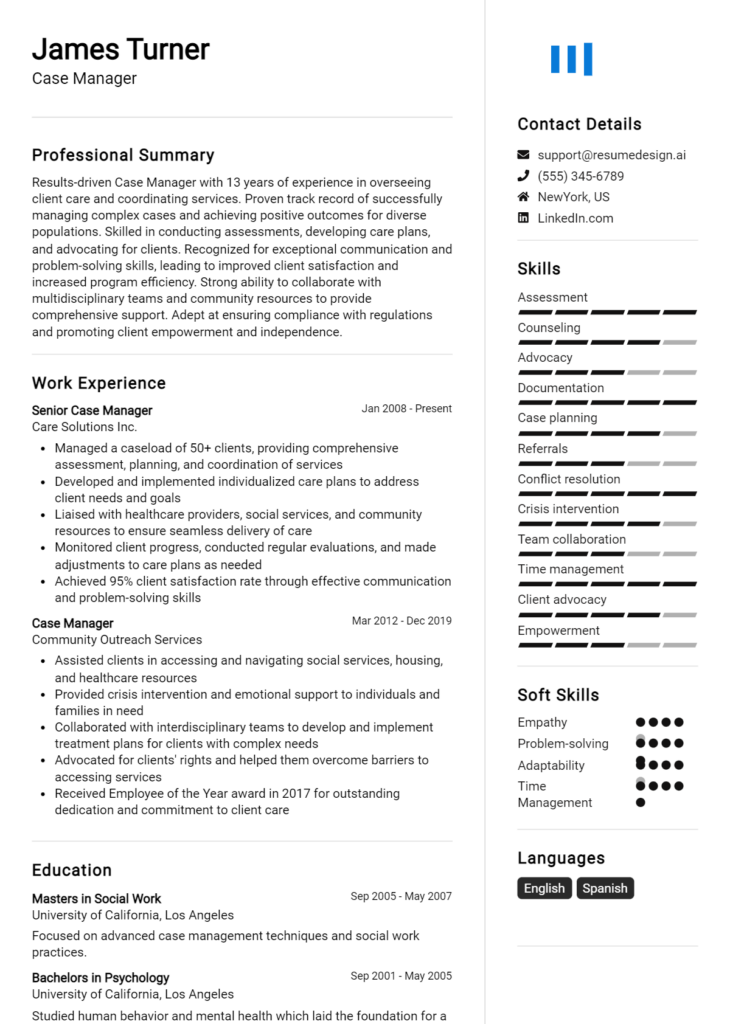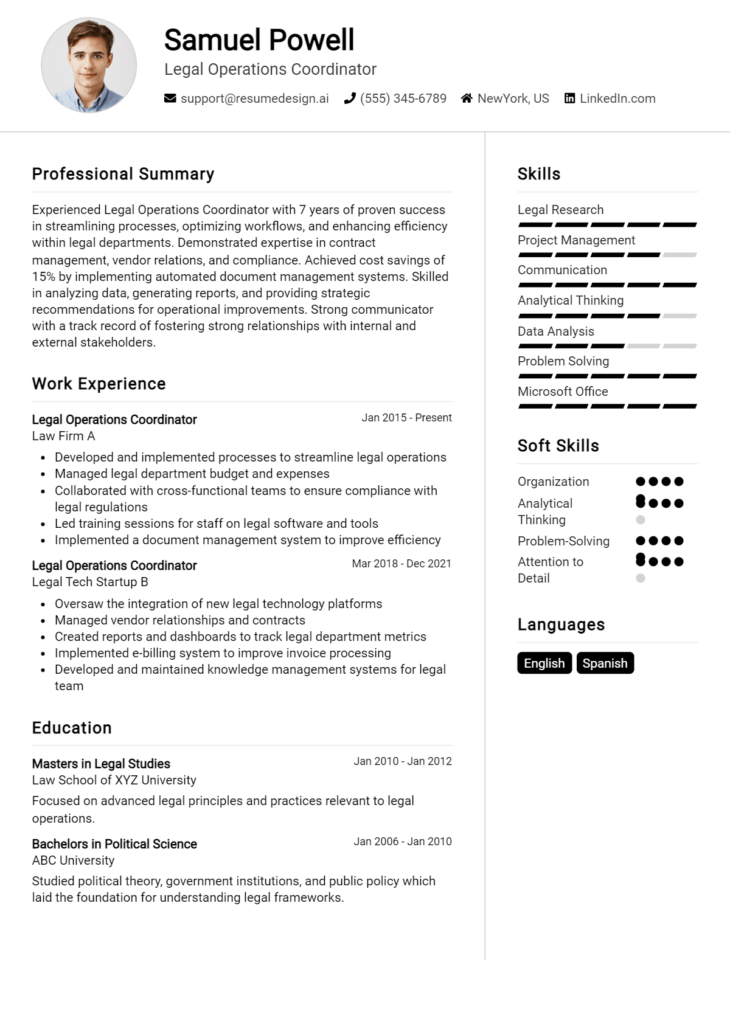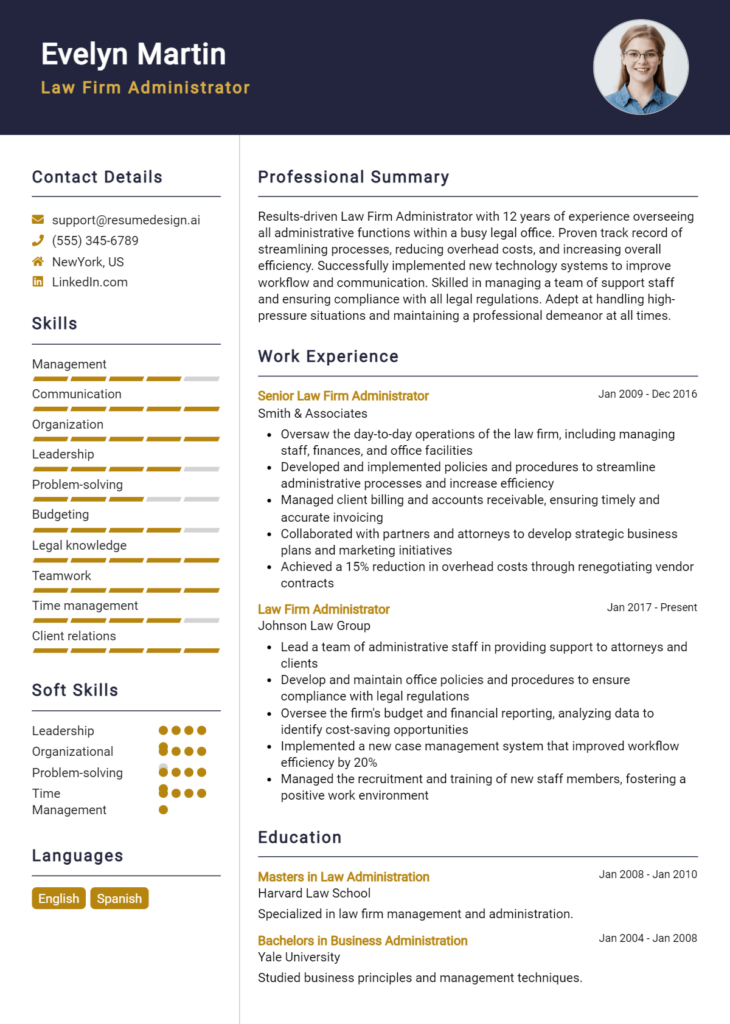Legal Data Analyst Core Responsibilities
A Legal Data Analyst plays a crucial role in bridging legal, compliance, and data management departments. They are responsible for analyzing legal data, ensuring compliance with regulations, and providing insights to support decision-making. Key skills include technical proficiency in data analysis tools, operational efficiency, and strong problem-solving abilities. These competencies are vital for aligning legal strategies with organizational goals. A well-structured resume can effectively showcase these qualifications, enhancing the candidate's appeal to potential employers.
Common Responsibilities Listed on Legal Data Analyst Resume
- Collecting and analyzing legal data to identify trends and insights.
- Preparing reports and presentations for legal teams and management.
- Ensuring data compliance with relevant laws and regulations.
- Collaborating with cross-functional teams to support legal initiatives.
- Developing and maintaining databases for legal documents and records.
- Utilizing data visualization tools to present findings effectively.
- Conducting quality assurance checks on legal data.
- Assisting in the development of legal strategies based on data analysis.
- Monitoring changes in legislation and assessing their impact on data management.
- Providing training and support for legal staff on data-related tools.
- Identifying opportunities for process improvement in data handling.
High-Level Resume Tips for Legal Data Analyst Professionals
In today's competitive job market, a well-crafted resume is essential for Legal Data Analyst professionals looking to make a strong first impression on potential employers. A resume often serves as the initial point of contact between a candidate and a hiring manager, and it needs to effectively reflect both the candidate's skills and achievements. For Legal Data Analysts, it's crucial that this document not only highlights technical competencies but also showcases the ability to interpret and analyze legal data effectively. In this guide, we will provide practical and actionable resume tips specifically tailored for Legal Data Analyst professionals, ensuring you stand out in a crowded field.
Top Resume Tips for Legal Data Analyst Professionals
- Tailor your resume to the specific job description by incorporating relevant keywords and phrases.
- Showcase your experience with legal databases and data analysis tools, emphasizing your familiarity with industry-specific software.
- Quantify your achievements by including metrics that demonstrate your impact, such as percentage improvements or time savings.
- Highlight any certifications or training relevant to data analysis or the legal field, such as Certified Data Analyst (CDA) or a law-related degree.
- Include a summary statement at the top that encapsulates your skills, experience, and what you can bring to the employer.
- Focus on your analytical skills by providing examples of how you’ve solved complex problems or improved processes within a legal context.
- Utilize bullet points for clarity and easy readability, ensuring that key achievements are easily identifiable.
- Incorporate any experience with legal research methodologies, demonstrating your ability to navigate legal documentation and data.
- Keep your resume concise and focused, ideally within one page, while ensuring it captures all relevant information effectively.
By implementing these tips, you can significantly increase your chances of landing a job in the Legal Data Analyst field. A well-structured and targeted resume will not only highlight your qualifications but also demonstrate your understanding of the role and industry, making you a compelling candidate for potential employers.
Why Resume Headlines & Titles are Important for Legal Data Analyst
In the competitive landscape of legal data analysis, a well-crafted resume headline or title plays a crucial role in capturing the attention of hiring managers. This succinct phrase serves as the first impression of a candidate’s qualifications, offering a snapshot of their expertise and suitability for the role. A strong headline can effectively summarize key skills, experiences, or accomplishments, allowing recruiters to quickly gauge a candidate's fit for the position. Therefore, it is essential that the headline remains concise, relevant, and directly aligned with the job being applied for, ensuring it stands out in a sea of applications.
Best Practices for Crafting Resume Headlines for Legal Data Analyst
- Keep it concise: Aim for one impactful phrase that encapsulates your qualifications.
- Be role-specific: Tailor your headline to reflect the specific requirements of the legal data analyst position.
- Highlight key skills: Include essential skills or tools relevant to the role, such as data analysis techniques or legal software.
- Use action-oriented language: Choose dynamic verbs that convey your proactive approach and achievements.
- Incorporate metrics if possible: Quantifying your accomplishments can add credibility and demonstrate your impact.
- Avoid jargon: Use clear language that can be easily understood by both legal and non-legal professionals.
- Ensure relevance: Align your headline with the job description to show you are a suitable candidate.
- Make it compelling: Use language that evokes interest and curiosity, prompting the hiring manager to read further.
Example Resume Headlines for Legal Data Analyst
Strong Resume Headlines
Results-Driven Legal Data Analyst with Expertise in Predictive Analytics and Compliance
Detail-Oriented Data Analyst Specializing in Legal Research and Data Visualization
Proven Track Record in Data Management and Legal Reporting to Enhance Operational Efficiency
Weak Resume Headlines
Legal Data Analyst
Experienced Professional Seeking Opportunities
The strong headlines are effective because they not only specify the candidate's expertise and skills but also convey a sense of accomplishment and relevance to the legal data analyst position. They grab attention and provide immediate insight into the candidate’s value. In contrast, the weak headlines fail to impress due to their vagueness and lack of specificity; they do not communicate any unique qualifications or strengths that would set the candidate apart from others, making them easy to overlook in a competitive job market.
Writing an Exceptional Legal Data Analyst Resume Summary
The resume summary is a critical component for a Legal Data Analyst, serving as the first impression hiring managers have of a candidate. A strong summary quickly captures attention by succinctly showcasing key skills, relevant experience, and notable accomplishments tailored to the specific job. It provides a snapshot of the candidate's qualifications, helping to differentiate them from other applicants. A compelling summary is concise and impactful, allowing the candidate to present themselves as the ideal fit for the role while aligning with the needs of the organization.
Best Practices for Writing a Legal Data Analyst Resume Summary
- Quantify achievements: Use numbers and metrics to demonstrate the impact of your work.
- Focus on relevant skills: Highlight specific skills that align with the job description.
- Tailor the summary: Customize your summary for each job application to reflect the requirements of the role.
- Be concise: Aim for 3-5 sentences that pack a punch without unnecessary detail.
- Use action verbs: Start sentences with strong action verbs to convey a sense of proactivity.
- Showcase industry knowledge: Mention any legal or data analysis trends and technologies you are familiar with.
- Highlight problem-solving abilities: Emphasize your capacity to analyze data and resolve legal issues effectively.
- Include certifications or relevant education: Mention any pertinent qualifications that enhance your candidacy.
Example Legal Data Analyst Resume Summaries
Strong Resume Summaries
Detail-oriented Legal Data Analyst with over 5 years of experience in data management and legal compliance. Successfully improved data retrieval processes by 30% through the implementation of automated solutions, resulting in a 20% decrease in project turnaround time.
Results-driven Legal Data Analyst proficient in SQL and data visualization tools, with a track record of analyzing complex datasets to support litigation strategies. Increased efficiency in legal research by 40% by developing a tailored data analysis framework.
Analytical and proactive Legal Data Analyst with a strong background in risk assessment and regulatory compliance. Led a team project that reduced compliance discrepancies by 25%, saving the firm $50,000 annually.
Weak Resume Summaries
Experienced data analyst looking for a legal position. I have worked with data and am familiar with legal concepts.
I am a legal professional with data analysis skills seeking a job. I can analyze information and help in various legal tasks.
The strong examples possess specific achievements, clear metrics, and relevant skills that directly relate to the role of a Legal Data Analyst, making them impactful and tailored. In contrast, the weak summaries are vague and generic, lacking quantifiable outcomes and failing to demonstrate how the candidate's skills and experience are applicable to the legal data analysis field. This distinction highlights the importance of specificity and relevance in crafting an effective resume summary.
Work Experience Section for Legal Data Analyst Resume
The work experience section of a Legal Data Analyst resume is pivotal in demonstrating the candidate's practical application of technical skills, leadership abilities, and commitment to delivering high-quality results. This section provides potential employers with insights into how the candidate has utilized their expertise in data analysis within a legal context, effectively managing teams and projects. Quantifying achievements and aligning experiences with industry standards not only enhances credibility but also illustrates the candidate's impact on previous organizations, making it essential for standing out in a competitive job market.
Best Practices for Legal Data Analyst Work Experience
- Clearly articulate technical skills relevant to legal data analysis, such as data mining, statistical analysis, and software proficiency.
- Quantify achievements by using metrics, percentages, or specific outcomes to demonstrate impact.
- Highlight collaborative efforts, showcasing experience working with cross-functional teams or legal professionals.
- Use action verbs to convey responsibility and initiative in past roles.
- Tailor your experiences to align with the specific requirements of the job you are applying for.
- Provide context by explaining the scale and scope of projects completed.
- Include any relevant certifications or training that enhance your data analysis skills.
- Focus on results-driven narratives that reflect your contributions to the organization.
Example Work Experiences for Legal Data Analyst
Strong Experiences
- Led a team of data analysts in a project that improved case resolution times by 30% through advanced data modeling techniques.
- Developed a predictive analytics tool that increased the accuracy of case outcome predictions by 25%, resulting in a 15% reduction in litigation costs.
- Collaborated with legal teams to streamline data reporting processes, achieving a 40% reduction in time spent on administrative tasks.
- Implemented a data governance framework that enhanced data integrity and compliance, leading to a 20% decrease in audit findings.
Weak Experiences
- Worked on various data projects.
- Assisted in data management tasks.
- Participated in team meetings and discussions.
- Helped with legal data analysis.
The examples provided illustrate a clear distinction between strong and weak experiences. Strong experiences effectively showcase quantifiable outcomes and specific contributions, demonstrating the candidate's technical leadership and collaborative efforts, while weak experiences lack detail and fail to convey any significant impact or achievement. By focusing on measurable results and clear responsibilities, candidates can create a compelling narrative that resonates with potential employers in the legal data analysis field.
Education and Certifications Section for Legal Data Analyst Resume
The education and certifications section of a Legal Data Analyst resume is crucial as it underscores the candidate's academic qualifications, industry-specific credentials, and commitment to ongoing professional development. This section serves to bolster the candidate's credibility by showcasing relevant degrees, certifications, and specialized training that align with the demands of the legal data analysis field. By including pertinent coursework and recognized certifications, candidates can significantly enhance their appeal to potential employers and demonstrate their capacity to contribute effectively to their organizations.
Best Practices for Legal Data Analyst Education and Certifications
- Prioritize relevant degrees, such as a Bachelor's or Master's in Data Science, Law, or a related field.
- Highlight industry-recognized certifications, such as Certified Analytics Professional (CAP) or Certified Information Systems Security Professional (CISSP).
- Include specific coursework that pertains to data analysis, legal research, or statistical methods.
- List certifications from reputable organizations or institutions to enhance credibility.
- Utilize clear formatting to ensure this section is easy to read and comprehend.
- Include any ongoing education or training to illustrate a commitment to continuous learning.
- Be concise and focus on qualifications that directly relate to the job description.
- Consider adding honors or awards received during academic pursuits to further distinguish your background.
Example Education and Certifications for Legal Data Analyst
Strong Examples
- Bachelor of Science in Data Analytics, University of California, 2021
- Certified Legal Data Analyst (CLDA), Legal Data Association, 2022
- Relevant Coursework: Statistical Analysis for Legal Professionals, Data Mining for Law, and Legal Research Methodologies.
- Master of Science in Information Systems, George Washington University, 2023
Weak Examples
- Bachelor of Arts in History, State University, 2010
- Certification in Basic Computer Skills, Online Learning Platform, 2019
- Relevant Coursework: Introduction to Philosophy, Art History, and English Literature.
- Diploma in Office Administration, Community College, 2015
The strong examples listed above are considered effective because they are directly relevant to the role of a Legal Data Analyst, showcasing degrees, certifications, and coursework that align with the skills and knowledge required in the field. In contrast, the weak examples illustrate qualifications that lack relevance to the position, highlighting outdated or unrelated educational paths that do not contribute to the candidate's suitability for the role. This distinction is vital for employers seeking candidates who can immediately contribute to their legal data analysis needs.
Top Skills & Keywords for Legal Data Analyst Resume
As a Legal Data Analyst, possessing a diverse set of skills is crucial for effectively managing the intersection of law and data analysis. A well-crafted resume highlights these competencies, showcasing your ability to interpret complex legal data, ensure compliance, and contribute to informed decision-making processes within legal frameworks. Employers seek candidates who not only have technical capabilities but also possess interpersonal skills that facilitate collaboration and communication within a legal team. By emphasizing your skills, you can demonstrate your value as a Legal Data Analyst and enhance your chances of landing the desired role.
Top Hard & Soft Skills for Legal Data Analyst
Soft Skills
- Attention to Detail
- Analytical Thinking
- Problem-Solving
- Communication Skills
- Team Collaboration
- Time Management
- Adaptability
- Critical Thinking
- Research Skills
- Ethical Judgment
Hard Skills
- Data Analysis
- Legal Research
- Familiarity with Legal Terminology
- Proficiency in Data Visualization Tools (e.g., Tableau, Power BI)
- Database Management
- Statistical Analysis
- Knowledge of Legal Software (e.g., LexisNexis, Westlaw)
- Excel Proficiency
- Programming Skills (e.g., SQL, Python)
- Compliance Knowledge
For further insights on essential skills, consider exploring more about skills and how to effectively present your work experience in your resume.
Stand Out with a Winning Legal Data Analyst Cover Letter
Dear Hiring Manager,
I am writing to express my interest in the Legal Data Analyst position at [Company Name], as advertised on [Job Board/Company Website]. With a robust background in data analysis combined with a comprehensive understanding of legal processes, I am excited about the opportunity to contribute to your team. My experience in analyzing complex legal data sets and providing actionable insights aligns perfectly with the requirements of this role, and I am eager to leverage my skills to support [Company Name] in making informed decisions.
During my previous role at [Previous Company Name], I successfully implemented data-driven strategies that enhanced the efficiency of case management processes. By utilizing advanced analytical tools, I was able to identify trends in case outcomes and present this information to legal teams, enabling them to develop more effective strategies. My proficiency in SQL, Python, and data visualization tools, paired with a keen attention to detail, has empowered me to deliver high-quality analysis that drives results. Moreover, my collaborative work style has fostered strong relationships with attorneys and stakeholders, ensuring that data insights are seamlessly integrated into the decision-making process.
I am particularly drawn to [Company Name] due to its commitment to innovation in the legal field. I admire how you leverage technology to improve client outcomes and enhance operational efficiency. I am excited about the chance to contribute to such initiatives and help further enhance your data analysis capabilities. I am confident that my analytical acumen, combined with my passion for the legal domain, makes me a strong candidate for this role.
Thank you for considering my application. I look forward to the opportunity to discuss how my skills and experiences align with the needs of your team. I am enthusiastic about the possibility of contributing to [Company Name] as a Legal Data Analyst and am eager to bring my expertise in data analysis to support your strategic goals.
Sincerely,
[Your Name]
[Your Phone Number]
[Your Email Address]
Common Mistakes to Avoid in a Legal Data Analyst Resume
Crafting a resume as a Legal Data Analyst requires a careful balance of showcasing technical expertise and legal knowledge. However, many applicants make critical mistakes that can hinder their chances of landing an interview. Understanding these common pitfalls can help you create a more effective resume that stands out to hiring managers in the legal field.
Neglecting Relevant Skills: Failing to highlight specific analytical tools or software relevant to legal data analysis can make your resume less appealing. Ensure you include skills like SQL, Python, or legal research databases.
Using Generic Language: A one-size-fits-all approach can dilute your qualifications. Tailor your resume to reflect the specific requirements of the job you are applying for, using industry-specific terminology.
Overloading with Technical Jargon: While it’s important to demonstrate your technical skills, using excessive jargon can alienate non-technical hiring managers. Strike a balance by clearly explaining your experience without overwhelming the reader.
Ignoring Quantifiable Achievements: Simply listing job duties without quantifying your achievements can make your contributions seem less impactful. Use metrics and percentages to illustrate your successes, such as “Increased data processing efficiency by 30%.”
Inconsistent Formatting: A cluttered or inconsistent format can distract from your qualifications. Use a clean, professional layout with consistent fonts, bullet points, and headings to enhance readability.
Lack of Tailored Experience: Including unrelated work experience can dilute your resume. Focus on roles that showcase your analytical skills, legal knowledge, and relevant experiences that align with the job description.
Omitting Certifications or Continuing Education: Not mentioning relevant certifications, such as Certified Analytics Professional (CAP) or courses in data analysis, can lessen your credibility. Always include ongoing education to demonstrate your commitment to professional growth.
Failing to Proofread: Typos or grammatical errors can undermine your professionalism. Always proofread your resume multiple times or ask someone else to review it to ensure it’s polished and error-free.
Conclusion
As we've explored, the role of a Legal Data Analyst is increasingly vital in today’s data-driven legal landscape. These professionals merge legal expertise with data analytics to provide insights that can enhance decision-making processes within law firms and corporate legal departments. Key responsibilities include analyzing legal data, generating reports, and employing analytical tools to support litigation strategies. Moreover, the demand for this role is expected to rise as organizations continue to prioritize data management and analytics.
To ensure you stand out in this competitive field, it's crucial to have a well-crafted resume that highlights your unique skills and experiences. Take the time to review and refine your Legal Data Analyst resume. Utilize resources such as resume templates to create a polished format, explore the resume builder for an easy crafting experience, and check out resume examples for inspiration. Additionally, consider enhancing your application with tailored cover letter templates that effectively communicate your qualifications.
Now is the perfect time to invest in your career by updating your resume and ensuring it reflects the skills and experiences that make you an exceptional candidate for the Legal Data Analyst position. Don’t miss out on the opportunity to make a lasting impression!

